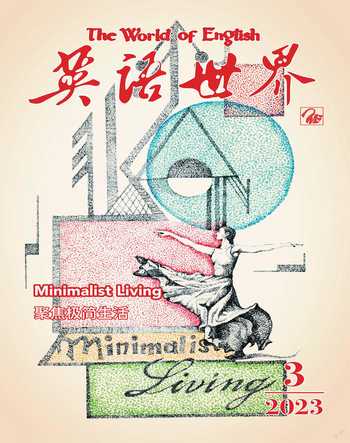Travelling to Tongchuan1铜川之行
2023-05-30沙博理任东升焦琳/译
沙博理 任东升 焦琳/译
The next day, September 1, we started for Yanan. We took a train at seven in the morning for Tongchuan, to the north, which was as far as the railway extended2. The rest of the way we would have to go by bus. Our fellow passengers were young people from all over China who got off at various stops along the road. Loud, cheerful youngsters from Jiangsu, south of the Yangtze3, were working in a local railway administration office. A moon-faced young man with round glasses, from Hainan Island, had become a forestry instructor at a university in Zhengzhou, in Henan, and was conducting his students on a field trip.
次日,九月一号,我们出发去延安。坐上早七点的火车一路朝北,先往铜川去,这趟车坐到头就是。余下的路程得换乘公共汽车。火车上有来自全国各地的年轻人,沿途哪个站下车的都有。其中几个喧闹活泼,来自苏南地区,在当地铁路管理局上班。还有个戴圆眼镜的圆脸儿小伙子,海南人,在河南郑州一所大学当林业专业教师,是领着学生去做田野调查的。
You saw these shifts of4 young population wherever you went, breaking down the old provincial narrowness, enriching the national culture, broadening peoples outlooks. The bobbed hair and smart attire of the pert girl textile workers from Shanghai were being emulated by their sisters in Xian, the languorous southern Yue music shared popularity with the more decisive northern opera arias on the Shaanxi radio. There were jokes and laughter over the misunderstandings caused by regional differences in pronunciation, but the laughter was good-natured and friendly. The youngsters were enjoying the exciting adventure5 they were sharing in building a new China.
无论走到哪里,都能看到这一拨又一拨的年轻人,他们正打破守旧的地域观念,丰富民族文化,拓宽彼此的眼界。从上海来的纺织女工活泼朝气,梳着齐耳短发,衣着时髦,西安的姑娘们争相效仿。陕西的无线电广播中,婉转的南方越剧和激越的北方戏一样受欢迎。不同地域发音差异也引起过误会,闹出不少乐子,引人大笑,但笑声里都是善意和友好。共同建设新中国这种激动人心的人生经历,年轻人乐在其中。
Our train was a local6, with hard wooden seats. The weather was hot and we were climbing continuously. By the time we got to Tongchuan we were pretty weary.
我们坐的是慢车,硬木座。天气又热,火车还一直爬坡,到达铜川时,大家早已疲惫不堪。
But we perked up when we saw what lay before us. Tongchuan, meaning “Copper Valley,” is a pass in the mountains guarding the northern flank of the Weihe River Plain and the city of Xian. It was well-garrisoned in ancient times, for it was through here that Tartar and Turkic nomadic tribesmen poured through in raids on their more affluent Han neighbors to the south. The name indicated there had been copper mines at one time, but these must have been worked out, for coal mining was now the major industry. Tongchuan had the biggest coal mine in the northwest.
一看眼前的景色,我們就又振奋起来。铜川,义为“铜的山谷”,是一处山间要隘,守卫着渭北平原和西安。此地在古代是重兵把守之地,因为鞑靼人和突厥游牧部落正是通过此处大举南下,突袭毗邻之地更为富庶的汉人。名为“铜川”,就是说这个地方有铜矿,但肯定早采掘完了,因为如今煤矿才是这里的主要工业,铜川的煤矿规模是西北地区之最。
Its beautiful country, this land of the yellow soil, known as “loess”7 in the West. Sticky and adhesive when wet, its fine for making bricks or building dams. When dry it is porous and light.8 Local people carve their homes out of yellow soil bluffs, merely boring a hole in the top for a chimney and adding a front wall of wood, with paper panes for the windows.9
可真是美啊,這片黄土地,西方称之为“黄土高原”。潮湿时,黄土黏性很强,制砖筑坝都很好用;干燥时,又多孔且轻。当地人在黄土峭壁上凿窑洞为家,只需在顶上钻个洞眼作烟囱,洞口加一堵木墙,窗棂上糊上纸,就大功告成。
There are few real mountains, but you see great heights and depths, because centuries of erosion have incised the yellow soil plateaus with huge canyons, some hundreds of yards deep and stretching for miles across. With a little water, the soil is fairly fertile. The problem is its dry most of the year, and then in late summer, usually August, heavy rains form torrents which race through the gullies and canyons, smashing everything in their path. The locals had started a drive10 to build check-dams and reservoirs, and to plant trees and bushes and grass. But it was difficult, for the population was small and the area vast.
在这儿很难看到真正的山,但目之所及都是高脊和深沟,这是因为千百年的侵蚀把黄土高原雕刻得千沟万壑,百米深谷绵延数公里。给点水,就相当肥沃。问题是一年之中大部分时间都干旱,唯有夏末时节,通常是八月,暴雨引发山洪,在沟壑峡谷中奔腾而过,所经之处,无不冲毁。当地人已经发动起来,建拦河坝修水库,植树种草。但由于地广人稀,难见成效。
After a late lunch heavily flavored with garlic in an earthen-floored restaurant carved out of a bluff, we walked into Tongchuans old walled city. It had only one real street, lined with a few stores and government offices. We were followed by a large gang of kids, very friendly, in high spirits, average age about nine. They were neatly dressed, many in new cotton prints. We were struck by the beauty of the children, especially some of the girls. Tall, well-proportioned, they had large eyes, fresh complexions11. A few were quite Western in their facial configuration. Raiding Central Asian tribesmen in ancient days were often exiled on capture to Yanan Prefecture, then a garrisoned border region, where they intermarried with the local girls.
我们在一家黄土地面的窑洞餐馆吃了蒜味浓郁的晌午饭后,漫步走进城墙环绕的铜川古城。里面只有一条像样的大街,两旁有几家商铺和政府机关。我们身后跟着一大帮孩子,都很和善,欢天喜地的,看着九岁上下,衣着整洁,不少人穿着印花新棉衣。这些孩子长得可真好看,尤其是个别女孩子。她们个头高高的,身量匀称,眼睛大大的,面色红润。有几个孩子的五官很有西方特征。古时候中亚部落的入侵者被俘后常流放到当时有屯兵驻守的延安府,便与当地姑娘通婚。
The city had a Tang Dynasty pagoda—a nine-storey tower. It was shabby and run-down. People are not impressed with antiquity per se. A mere thousand years is nothing in a land where recorded history runs back 3,000 and detailed legends commenced four millennia ago.
铜川市有一座唐代宝塔,九层高,年久失修,破败不堪。人们对古迹不太在意,在这个三千年前就有历史记载、四千年前便有详细传说的国度,才一千年历史的古迹算不得什么。
Our bus would leave the next day. We were put up in a government office compound, in rooms of cadres out on field trips. Tongchuan had no hotel, only inns “not suitable for foreign guests.” We were given bedding, hot water for washing, good tea. There was no charge. We went to bed at 7:30, worn out. They told us the Yanan bus, due to leave at five in the morning, might not. There had been rain up north, and water made the yellow soil slick and dangerous on mountain roads.
公共汽车次日才会离开铜川。晚上我们被安置在政府大院里,住的是外出考察干部的房间。铜川没有招待所,有的只是小旅店,但都“不适合招待外宾”。用的被褥、洗漱的热水、喝的好茶,都不需要我们付钱。我们累得够呛,七点半就睡了。有人通知说,去延安的公共汽车本来明天早上五点发车,但这个点儿可能走不了了,因为北边下过大雨,山路上黄土泥泞,湿滑危险。
Most freight was hauled on two-wheeled carts, pulled by horses and mules in mixed teams of four, with one animal in shafts and three in forward traces. The squeal of their brakes—a wooden block pressing on a round metal drum on the axle—never stopped.12 It was the last thing we heard as we fell asleep and the first thing we heard on awakening in the morning.
當地运货多用两轮马车,拉车的马和骡子总共四匹,一匹架辕三匹拉车。刹车说白了就是个木块,一压车轴上的金属鼓轮,发出尖锐的吱呀声,不绝于耳。入睡前最后听见的就是这个动静,清晨醒来最先听见的还是这个。
At seven there was still no bus. They said at the station they wouldnt know about the condition of the roads until ten. We had breakfast in our cave restaurant, crisp oil fritters and soybean milk. As we sat dawdling over our food we felt strangely at peace. We had already become accustomed to the screech of brakes as the carts, laden with coal, checked their speed on the downgrades, and listened with half an ear to the Beijing opera and Shaanxi folk songs audible from loudspeakers across the valley through the clear mountain air.13
七点钟了汽车仍没来。车站的人说要到十点才会知道路况。我们在窑洞餐馆吃了个早饭,酥脆的油条就着豆浆。坐在那儿悠闲地吃着,竟然感觉很平静,原是我们已经习惯了装满煤炭的马车下坡减速时刺耳的刹车声,一边吃一边还能从中分辨出大喇叭里的京剧和陕西民歌,那是透过清新的山间空气从山谷对面传来的。
We finally left on the bus at 11, due to reach Yanan by eight that night.
我们终于在十一点坐上汽车离开铜川,晚上八点应该能到延安。
